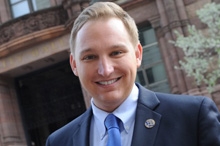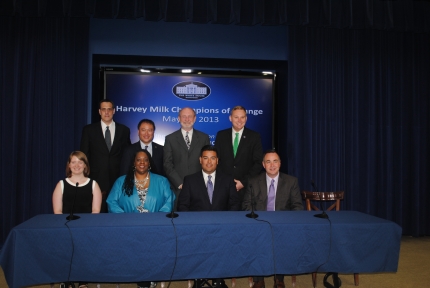Latest News
Prevention Delivers for Teens in the US
Posted by on May 31, 2013 at 3:06 PM EDTEd. note: This is cross-posted from The Huffington Post. Read the original post.
This May, as we observe National Teen Pregnancy Prevention Month, there is encouraging news to report in our nation's ongoing effort to prevent teen pregnancies. The latest figures released today by the Centers for Disease Control and Prevention (CDC) show that the decline in teen births seen over the past two decades has accelerated in recent years.
The report found that birth rates for teenagers aged 15-19 fell 25 percent nationwide during the five year period (2007-2011) covered by CDC's newest study, resulting in a new record low. Birth rates among Hispanic teens, which had been higher than other racial and ethnic groups, saw a remarkable 34 percent decline over the same five year time span.
Declines in State Teen Birth Rates by Race and Hispanic Origin: Key Findings
- Teen birth rates fell at least 15% for all but two states during 2007–2011—the most recent period of sustained decline; rates fell 30% or more in seven states.
- Declines in rates were steepest for Hispanic teenagers, averaging 34% for the United States, followed by declines of 24% for non-Hispanic black teenagers and 20% for non-Hispanic white teenagers.
- The long-term difference between birth rates for non-Hispanic black and Hispanic teenagers has essentially disappeared, and by 2011 their rates were similar.
- Rates for Hispanic teenagers fell 40% or more in 22 states and the District of Columbia (DC); rates dropped at least 30% in 37 states and DC.
To what can we attribute this dramatic drop in teen births? There are a number of key factors, including stronger teen pregnancy prevention education, the choice by many teens to delay sex, and higher rates of contraceptive use by teens who are sexually active.
Learn more aboutThe First-Ever Hispanic Business Leaders’ Forum at the White House
Posted by on May 30, 2013 at 7:09 PM EDTYesterday, the White House convened the nation’s top Hispanic business leaders from across the country for the first-ever White House Hispanic Business Leaders’ Forum. Over 80 leaders from a range of industries participated in the day-long interactive event, which included panels and break-out sessions focused on the economy, innovation and entrepreneurship, Latino leadership in America, federal contracting, healthcare and commonsense immigration reform.
Hosted with the U.S. Hispanic Chamber of Commerce, the forum offered these business leaders an opportunity to meet with top-level Administration officials to discuss some of the most pressing issues affecting American businesses, as well as ways to collaborate more effectively to foster economic competiveness, particularly in Latino communities.
As Senior Advisor and Assistant to the President for Public Engagement and Intergovernmental Affairs Valerie Jarrett explained in her opening remarks, “To compete in today’s economy, we must draw from the talents, perspectives, and leadership of every community in our country. Today’s inaugural White House Hispanic Business Leaders’ Forum is a key part of making this a reality.”
Treasury Secretary Lew, who provided an economic overview at the forum, underscored that “Our economy is stronger today because our businesses are doing what they do best—innovating, expanding and hiring.”
“With the number of Hispanic-owned businesses growing at twice the national average, the Hispanic community is playing a critical role in the recovery. But as the business and community leaders I met with today agreed, we must do more to strengthen the middle class so that more Americans can get back to work and more businesses can succeed. Our top priority as a nation has to be growing the economy and creating good jobs in the United States.”
Learn more aboutJewish American Heritage Month
Posted by on May 30, 2013 at 8:48 AM EDTLast week, the White House celebrated the eighth annual Jewish American Heritage Month. As President Obama declared in his proclamation honoring this month, “More than 350 years have passed since Jewish refugees first made landfall on American shores. We take this month to celebrate the progress that followed, and the bright future that lies ahead.”
Over 150 students, organization representatives, and leaders from the American Jewish community gathered in the White House to enjoy a staging of the “Gefilte Fish Chronicles: The Musical”, which was adapted to a musical production following its successful 2007 television premiere. “The Gefilte Fish Chronicles” speaks to the Jewish American experience and to the rich traditions and stories that American Jews have kept alive across the generations.
The audience also had the opportunity to hear from Senior Advisor to the President, Valerie Jarrett, who spoke about the President’s commitment to the American Jewish community and from Congresswoman Debbie Wasserman Schultz, who was the driving force behind JAHM’s inception in 2006. We thank them for their participation in this unique event.
Zachary Kelly is Special Assistant to the Deputy Chief of Staff and works with the Office of Public Engagement on Jewish outreach.
Learn more aboutHonoring Harvey Milk Champions of Change
Posted by on May 28, 2013 at 5:46 PM EDTEarlier this week, the White House honored ten openly LGBT elected or appointed officials as “Harvey Milk Champions of Change.” The event took place on May 22nd – Harvey Milk's birthday – and was intended to pay tribute to Harvey Milk’s life, leadership, and legacy.
Established in 2011, the White House Champions of Change program regularly spotlights Americans who are doing extraordinary things for their community, their country, and their fellow citizens. The ten LGBT officials honored as Harvey Milk Champions were chosen for their strong commitment to both equality and public service.
In the words of Valerie Jarrett, Senior Advisor to the President, “When President Obama posthumously awarded Harvey Milk the Medal of Freedom in 2009, he praised his leadership and courage in running for office. Today, we honor Harvey Milk’s legacy in these ten outstanding public servants, who will surely inspire the next generation of public servants.”
The following individuals were honored as Harvey Milk Champions of Change:
- Simone Bell, Georgia State Representative (Atlanta, GA)
- Angie Buhl O'Donnell, South Dakota State Senator (Sioux Falls, SD)
- Karen Clark, Minnesota State Representative (South Minneapolis, MN)
- Michael Gin, Mayor of Redondo Beach (Redondo Beach, CA)
- Kim Coco Iwamoto, Hawaii State Civil Rights Commissioner (Honolulu, HI)
- John Laird, California Secretary of Natural Resources (Santa Cruz, CA)
- Ricardo Lara, California State Senator (Long Beach, CA)
- Kim Painter, Johnson Country Recorder (Iowa City, IA)
- Chris Seelbach, Cincinnati City Council Member (Cincinnati, OH)
- Pat Steadman, Colorado State Senator (Denver, CO)
Learn more about Civil RightsHonoring Harvey Milk Champions of Change
Posted by on May 28, 2013 at 5:46 PM EDTEarlier this week, the White House honored ten openly LGBT elected or appointed officials as “Harvey Milk Champions of Change.” The event took place on May 22nd – Harvey Milk's birthday – and was intended to pay tribute to Harvey Milk’s life, leadership, and legacy.
Established in 2011, the White House Champions of Change program regularly spotlights Americans who are doing extraordinary things for their community, their country, and their fellow citizens. The ten LGBT officials honored as Harvey Milk Champions were chosen for their strong commitment to both equality and public service.
In the words of Valerie Jarrett, Senior Advisor to the President, “When President Obama posthumously awarded Harvey Milk the Medal of Freedom in 2009, he praised his leadership and courage in running for office. Today, we honor Harvey Milk’s legacy in these ten outstanding public servants, who will surely inspire the next generation of public servants.”
The following individuals were honored as Harvey Milk Champions of Change:
- Simone Bell, Georgia State Representative (Atlanta, GA)
- Angie Buhl O'Donnell, South Dakota State Senator (Sioux Falls, SD)
- Karen Clark, Minnesota State Representative (South Minneapolis, MN)
- Michael Gin, Mayor of Redondo Beach (Redondo Beach, CA)
- Kim Coco Iwamoto, Hawaii State Civil Rights Commissioner (Honolulu, HI)
- John Laird, California Secretary of Natural Resources (Santa Cruz, CA)
- Ricardo Lara, California State Senator (Long Beach, CA)
- Kim Painter, Johnson Country Recorder (Iowa City, IA)
- Chris Seelbach, Cincinnati City Council Member (Cincinnati, OH)
- Pat Steadman, Colorado State Senator (Denver, CO)
Learn more about Civil RightsProving them Wrong
Posted by on May 28, 2013 at 4:38 PM EDT
As a middle-class kid from Kentucky, I moved to Cincinnati, Ohio for college. When I arrived, I found a city deeply divided on issues of race and sexual orientation.
Five years prior to my arrival, Cincinnati voters passed perhaps the most anti-gay local law our country has ever seen. The law, Article XII, denied the city from even considering the inclusion of sexual orientation or gender identity in the housing & workplace non-discrimination law. A double whammy. Three years after my arrival, the city erupted into a racial unrest.
Coming from a family of fighters, I immediately began trying to create change. While in law school, I helped lead the efforts to repeal Article XII. We spent two years going door-to-door, having honest conversations with people on the door steps about gay rights. We said the word “gay.” We didn't talk about general terms like "equality" and "fairness," but engaged people in why we thought it was wrong to fire someone or deny them housing based solely on who they loved. These conversations were the catalyst to the successful repeal, the only winning gay-rights initiative in the country in 2004 (a year when 13 states banned marriage equality in their constitutions).
After my long-term mentor & Vice-Mayor of the City of Cincinnati, David Crowley, was term limited in 2009 and soon thereafter passed away, I decided to run for Council. All the political experts and insiders said the same thing: “It’s impossible for you to win: 1) You’re not originally from here; 2) You’re too young; and 3) You’re openly gay.”
That kind of skepticism has always been my biggest motivation. I am most motivated by proving to the world that it doesn’t matter: 1) What color your skin is; 2) How much money you make; 3) Where you were born; or 4) Who you love. If you have good ideas, work really hard & treat people with respect, there are no limits to success.
And we did prove them wrong! In 2011, on my first run for political office, I became the first openly gay person elected in Cincinnati, Ohio and the first openly gay man elected in any of the four major cities throughout Ohio. Since my election, I have lead the efforts to: 1) Extend equal partner health benefits to all city employees; 2) Create an LGBT police & fire liaison; and 3) Make it mandatory for anyone accepting city funding or subsidies to agree, in writing, to an inclusive non-discrimination policy. These efforts have results in a 19-point increase in the Human Rights Campaign Municipal Equality Index. And all of these votes were passed by a 9-member Council that consists of 5 African Americans, 3 women and four political parties (Democrats, Republicans, Independents & Charterites).
My story continues today as we strive to create a city (and a world) where we all feel valued, welcomed and respected.
Chris Seelbach is a Cincinnati Council Member
Learn more about Civil RightsA Public Service Career with Purpose
Posted by on May 28, 2013 at 3:16 PM EDT
Throughout my public service career, I have quietly promoted an issue that is close to my heart: the importance of civil rights for LGBT individuals. Over the years, my husband Christopher has attended numerous public events and functions with me. The Redondo Beach and South Bay Community has personally become familiar with the two of us being together and doing the things that any other married elected official couple would do. Redondo Beach residents would frequently see and converse with us while shopping for groceries and running other errands through town. In 2012, I was honored as the Morris Kight Political Grand Marshal of the Long Beach, CA LGBT Pride Parade.
In 2011, I had the honor of appearing on NPR’s “All Things Considered” program with Karen Grigsby-Bates. Ms. Grigsby-Bates interviewed several Mayors from throughout the county for her piece “Governing in Tough Times” and discussed how each Mayor was dealing with the Great Recession in their cities. During the program, Ms. Grigsby-Bates highlighted a photo of me and my husband, Christopher. After the program aired, I received many positive and supportive comments from the community and beyond, that my husband was featured on a national radio program. While the program was not specifically geared towards LGBT issues, I found an opportunity to help spread the importance of civil rights for LGBT individuals throughout our community and Nation.
One of my proudest moments on a national stage came during my farewell speech in January at the 2013 Winter Meeting of the United States Conference of Mayors. Since 2009, I have had the honor of serving on the Advisory Board of the United States Conference of Mayors (USCM). The USCM membership is comprised of Mayors of the principal cities from throughout the United States whose cities’ populations exceed 30,000. At the end of my farewell speech, I pointed out my husband Christopher in the audience and personally thanked him for always being with me throughout my service as Mayor. The room full of several hundred mayors from throughout the United States gave me a standing ovation.
Michael A. Gin is Mayor of Redondo Beach, CA.
Learn more about Civil RightsEqual Rights in Colorado
Posted by on May 28, 2013 at 2:31 PM EDT
I’ve been working for equal rights in Colorado for over two decades. While I was attending law school at the University of Colorado I became involved in local LGBT rights campaigns. In 1991, I campaigned against a voter-initiated repeal of Denver’s recently amended civil rights ordinance. The city council added protections based on sexual orientation, but right after it took effect a petition drive was started to repeal the new protections. The equal protection ordinance survived the election.
Later that year a petition was circulated to place an anti-gay amendment to the state constitution on the ballot. Known as “Amendment 2,” the initiative was passed by voters in 1992, sparking a boycott and leading to Colorado being called the “Hate State.” I worked on the campaign opposing Amendment 2 and organized the lawsuit challenging it in court. The case went all the way to the United States Supreme Court and resulted in the landmark Romer v. Evans decision in 1996, the first major victory for LGBT rights in our nation’s highest court.
My involvement in LGBT rights led me to a career in politics. I spent fifteen years lobbying the General Assembly and running statewide ballot initiative campaigns. My clients included school districts, health care providers, the statewide LGBT advocacy organization and other progressive groups. In 2009, I was elected to fill the remainder of a state senate term. I’ve been twice re-elected to the seat.
I’ve watched the State of Colorado evolve its thinking on LGBT issues. The Amendment 2 litigation sparked a backlash, and when the case concluded the legislature began a prolonged debate over same-sex marriage. But the first state legislator came out, and soon openly gay candidates were getting elected. The more we talked about our issues and the more visible we became, the more progress we made. Early setbacks and legislative roadblocks gave us a reason to organize, mobilize and elect supporters. Slowly, and with perseverance, things began to change.
It took 10 years, but in 2005 we passed legislation expanding Colorado’s existing hate crimes act to include sexual orientation and gender identity. In 2007, a new governor signed the Employment Non-Discrimination Act that his predecessor had twice vetoed. He went on to sign housing and public accommodations protections, second-parent adoption, equal benefits, and a new estate planning tool for unmarried persons known as a “designated beneficiary agreement.”
My predecessor in the Colorado Senate was the first openly LGBT person to serve in the legislature. Today there are eight, including the Speaker of the House. I now serve as the Chair of the Joint Budget Committee, one of the most powerful positions in our legislature. In the recently completed 2013 legislative session I was the prime sponsor of the Colorado Civil Unions Act, a law that took effect on May 1, 2013. Because of a constitutional amendment passed by voters in 2006, marriage equality is prohibited in our state, and civil unions are the most the legislature can do until the constitution is amended again, or until the right lawsuit comes around. Judging from the progress we’ve made in Colorado and all across the country we’re optimistic that things will continue to get better.
Pat Steadman is a Colorado State Senator.
Learn more about Civil Rights
- &lsaquo previous
- …
- 80
- 81
- 82
- 83
- 84
- 85
- 86
- 87
- 88
- …
- next &rsaquo




Twitter